Munich
Copyright: München Tourismus, J. LutzMunich
In Munich, there is so much more than just the Oktoberfest or Lederhosen. The beautiful Bavarian capital has much more to offer. A mixture of exclusive shopping, art, culture, indulgence, and tradition makes this city unmistakable. Moreover, Germany’s most cheerful residents live here.The City
In Munich, it’s the mix that makes the message. Old meets new, past meets present and future, the modern blends harmoniously with the traditional, bits and bytes with beer, business and leisure. For the visitor, there is never any shortage of sights to see or activities to engage in. The Bavarian Metropolis with its 1.5 million inhabitants lies virtually at the centre of Europe. Munich’s origin goes back to an early settlement of monks from the Tegernsee Monastery which was called “ad Munichen” (the monks’ home). The situation leading to its later growth was treated by an act of violence of Henry the Lion, Duke of Bavaria from the House of Guelph. At that time the salt transports coming from Reichenhall and Hallein had to go over a bridge spanning the Isar River at Föhring north of Munich. The bridge passage was accompanied by a toll, and this traffic brought considerable revenue to the Bishop of Freising in whose territory Föhring was located. Henry the Lion had this bridge destroyed forcing the salt transports to use his new bridge a few miles upstream in ducal territory. On June 14, 1158, the new bridge, the market, the customs office and the mint at “Munichen” were approved by imperial decree thus in one fell swoop the monastic settlement assumed a completely different function. The rapidly prospering town was selected by the ruling family of the Wittelsbach in the middle of the 13th century as its Residence due to a territorial split and in 1294 it was granted a new municipal charter. During the reign of Emperor Ludwig the Bavarian – of the Wittelsbach family – the city extended its walls six fold and in 1504 it finally became the capital of the reunited Duchy of Bavaria. Under the 700 years of Wittelsbach reign as dukes, electors and kings Munich attained increasingly the reputation of being a European centre of culture. Year after year, Munich takes gold in German city rankings. When asked where they would prefer to live, most Germans say Munich. The reason is simple: a magic combination of a vigorous economy and top-notch leisure time activities and outstanding cultural offerings. Welcome back to Munich! Since Pentecost holidays in Munich are finally possible again: Hotels and guesthouses can welcome guests again, museums and galleries are open again, Guided tours are again possible, and the catering trade can again entertain guests inside and outside. We look forward to seeing you again in Munich! Please continue to keep a safe distance of at least one and a half metres from other people. In addition, wearing a mouth-and-nose protector on public transport as well as in all shops, museums, galleries, exhibitions, etc. is prohibited. It is also compulsory within the catering trade. Non-observance will be prosecuted under criminal law. Further information can be found at www.muenchen.de/int/enEvents
Munich offers a large selection of events when it comes to art, music, sports and traditional "fests" (parties). We have listed some important events below, but you can find more on: www.muenchen.de/int/en/eventsAccommodations
Do & See
Munich has come to be associated with Oktoberfest, the Hofbräuhaus, the Olympic grounds, and the Fasching carnival. However, Munich also has an international reputation as a metropolis of both art and culture. Its music scene ranges from classical to jazz and pop, and the many museums display impressive collections.
Dining
Perhaps most people associate Munich with beer, and there certainly are a lot of breweries and beer halls in the city. But don't miss Munich's classic high-calorie everyday cooking. Schweinshaxe is a roasted ham hock or "pork knuckle," and it goes well with sauerkraut and Knödel, which are boiled dumplings. We also recommend Apfelstrudel (apple strudel) and custard or a Dampfnudel (a kind of cream bun with chocolate or vanilla custard) for dessert.
Cafes
The café culture in Munich is rather exclusive. Particularly if you stick to the area around Marienplatz and Odeonsplatz. Most cafés are open from 10am and serve breakfast as well as warm meals.
Bars & Nightlife
Football players, musicians, and media elite, Munich's nightlife is swarming with celebrities. The city offers a large selection of trendy bars & nightclubs, not to mention iconic beer halls and gardens, which you simply cannot leave the city without visiting.
Shopping
No city break is complete without a good long stroll through the shops. Munich offers absolutely ideal conditions for a great big splurge: haute couture in the Maximilianstrasse, Theatinerstrasse, Residenzstrasse and Brienner Strasse, department and chain stores in the pedestrian precinct, trendy and flamboyant clothes between many galleries in such town districts as the Gärtnerplatz and Glockenbach area, Haidhausen or Schwabing, Bavarian local costumes, handicrafts and souvenirs in specialist shops, delicacies from all over the world at Dallmayr’s or Käfer’s, the leading delicatessens in Europe, or at the Victuals Market in the heart of the city. Another typical feature of Munich is the number of small shops that concentrate on a few articles, for example, umbrellas, felt, gloves, candles or wood carvings, and which are still to be found in the centre of town. Munich’s ultra-chic shopping area additionally covers Perusastrasse, Residenzstrasse, Brienner Strasse and Odeonsplatz. You will discover gems in the shop belonging to the Nymphenburg Porcelain factory (Odeonsplatz 1), which has been based in Munich for over 250 years. In the district of purveyors to the court, where not only the Bavarian king was a customer, you can go on a regal shopping expedition – from porcelain, jewellery and select delicacies to high-quality shoes and clothing. The recently opened “Maximilianshöfe” – Maximilian’s court yards - will also carry you off into the world of international design. You can take a break from shopping in the columned hall of the former “Marstall” – the royal stables, as a new restaurant has been established in the classified historical building. Outside the old town centre, for example in Schwabing, Haidhausen, around the Gärtnerplatz and in the Glockenbach area, the shops – and the customers – are quite obviously more unconventional. The Gärtnerplatz and the Glockenbach district are also ideal shopping areas for gays and lesbians. Shop ateliers, boutiques and concept stores, with many cafés and bars in between that are open during the day, invite you to go shopping, to look and enjoy yourself. Bargain-hunters are in their element at flea markets and designer outlets, or they amuse themselves in search of curiosities and crockery, junk and antiques at an old Munich institution, the street market-cum-funfair called the Auer Dult (in May, July/August and October).

 Copyright: © München Tourismus, S. Müller
Copyright: © München Tourismus, S. Müller
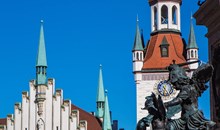 Copyright: © München Tourismus, Werner Boehm
Copyright: © München Tourismus, Werner Boehm
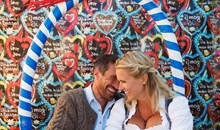 Copyright: © München Tourismus, Christian Kasper
Copyright: © München Tourismus, Christian Kasper
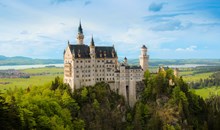 Copyright: Vinay Chavan/Unsplash
Copyright: Vinay Chavan/Unsplash
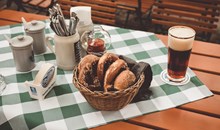 Copyright: Clay Banks/Unsplash
Copyright: Clay Banks/Unsplash
 Copyright: München Tourismus, Natalia Michalska
Copyright: München Tourismus, Natalia Michalska
 Copyright: © München Tourismus, Luis Gervasi
Copyright: © München Tourismus, Luis Gervasi
 Copyright: MUCA
Copyright: MUCA
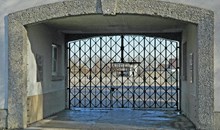 Copyright: Terence Burke/Unsplash
Copyright: Terence Burke/Unsplash
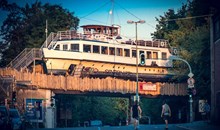 Copyright: © München Tourismus
Copyright: © München Tourismus
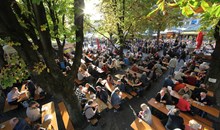 Copyright: © München Tourismus, S. Müller
Copyright: © München Tourismus, S. Müller
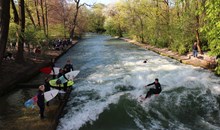 Copyright: © München Tourismus, Werner Boehm
Copyright: © München Tourismus, Werner Boehm
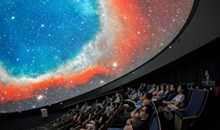 Copyright: © München Tourismus
Copyright: © München Tourismus
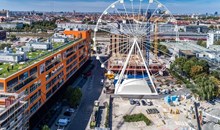 Copyright: © München Tourismus
Copyright: © München Tourismus
 Copyright: © München Tourismus
Copyright: © München Tourismus
 Copyright: München Tourismus, Christian Kasper
Copyright: München Tourismus, Christian Kasper
 Copyright: München Tourismus, Christian Kasper
Copyright: München Tourismus, Christian Kasper
 Copyright: © München Tourismus, Christian Kasper
Copyright: © München Tourismus, Christian Kasper
 Copyright: © München Tourismus, W. Boehm
Copyright: © München Tourismus, W. Boehm
 Copyright: München Tourismus, Sigi Mueller
Copyright: München Tourismus, Sigi Mueller
 Copyright: © München Tourismus, Tommy Lösch
Copyright: © München Tourismus, Tommy Lösch
 Copyright: © München Tourismus, Tommy Loesch
Copyright: © München Tourismus, Tommy Loesch
 Copyright: © München Tourismus
Copyright: © München Tourismus
 Copyright: © München Tourismus
Copyright: © München Tourismus
 Copyright:
Copyright:
 Copyright: Jens Weber
Copyright: Jens Weber
 Copyright: München Tourismus, Christl Reiter
Copyright: München Tourismus, Christl Reiter
 Copyright: © München Tourismus
Copyright: © München Tourismus
 Copyright: GreyLine
Copyright: GreyLine
 Copyright: City of Munich
Copyright: City of Munich
 Copyright: © München Tourismus, Jan Saurer
Copyright: © München Tourismus, Jan Saurer
 Copyright: München Tourismus, Luis Gervasi
Copyright: München Tourismus, Luis Gervasi
 Copyright: TZ München
Copyright: TZ München
 Copyright: ©DanielSchvarcz
Copyright: ©DanielSchvarcz
 Copyright: 35 milli(m)eter
Copyright: 35 milli(m)eter
 Copyright: Fiylo
Copyright: Fiylo
 Copyright: Uhl
Copyright: Uhl
 Copyright: Nürnberger Bratwurst Glöckl am Dom
Copyright: Nürnberger Bratwurst Glöckl am Dom
 Copyright: Donisl
Copyright: Donisl
 Copyright: Bistro im Feinkostladen
Copyright: Bistro im Feinkostladen
 Copyright: Bier & Keller
Copyright: Bier & Keller
 Copyright: „Das Weinheim – Gastronomie und Handel GmbH
Copyright: „Das Weinheim – Gastronomie und Handel GmbH
 Copyright: Enter the dragon
Copyright: Enter the dragon
 Copyright: blogwithlove
Copyright: blogwithlove
 Copyright: Rainer Germann
Copyright: Rainer Germann
 Copyright: Aloha Poke
Copyright: Aloha Poke
 Copyright: Schwarzreiter
Copyright: Schwarzreiter
 Copyright: https://minimuc.files.wordpress.com/2013/09/wpid-imag0338.jpg
Copyright: https://minimuc.files.wordpress.com/2013/09/wpid-imag0338.jpg
 Copyright: brennergrill
Copyright: brennergrill
 Copyright: City of Munich
Copyright: City of Munich
 Copyright: © München Tourismus, Jörg Lutz
Copyright: © München Tourismus, Jörg Lutz
 Copyright: Park Cafe
Copyright: Park Cafe
 Copyright: Schuhbeck
Copyright: Schuhbeck
 Copyright: mapio
Copyright: mapio
 Copyright: mux.de
Copyright: mux.de
 Copyright: mux.de
Copyright: mux.de
 Copyright: City of Munich
Copyright: City of Munich
 Copyright: Pfistermühle
Copyright: Pfistermühle
 Copyright: photography-ftw
Copyright: photography-ftw
 Copyright: City of Munich
Copyright: City of Munich
 Copyright: Café am Beethovenplatz
Copyright: Café am Beethovenplatz
 Copyright: Wo Deutschland am schönsten isst
Copyright: Wo Deutschland am schönsten isst
 Copyright: Go Yellow
Copyright: Go Yellow
 Copyright: S3 Media
Copyright: S3 Media
 Copyright: Cotidiano
Copyright: Cotidiano
 Copyright: Allerlei GGMTours
Copyright: Allerlei GGMTours
 Copyright: Cafe Fräulein
Copyright: Cafe Fräulein
 Copyright: lamoodfood
Copyright: lamoodfood
 Copyright:
Copyright:
 Copyright: München Tourismus - Christian Kasper
Copyright: München Tourismus - Christian Kasper
 Copyright: Cafe Kranich
Copyright: Cafe Kranich
 Copyright: Vogelmeier
Copyright: Vogelmeier
 Copyright: Cafe Jasmin
Copyright: Cafe Jasmin
 Copyright: Mery Reif / Lova Design für Mary's Coffee Club
Copyright: Mery Reif / Lova Design für Mary's Coffee Club
 Copyright: Fuck the falten
Copyright: Fuck the falten
 Copyright: Café Lotti
Copyright: Café Lotti
 Copyright: Maelu
Copyright: Maelu
 Copyright: Geheimtipp München
Copyright: Geheimtipp München
 Copyright: Daniel Schvarcz
Copyright: Daniel Schvarcz
 Copyright: PUSSER'S New York Bar
Copyright: PUSSER'S New York Bar
 Copyright: City of Munich
Copyright: City of Munich
 Copyright: Schumann´s GmbH
Copyright: Schumann´s GmbH
 Copyright: Cocktails
Copyright: Cocktails
 Copyright: Nina Vogl
Copyright: Nina Vogl
 Copyright: Backstage Concerts GmbH
Copyright: Backstage Concerts GmbH
 Copyright: KIDKUTSMEDIA, Harry Klein
Copyright: KIDKUTSMEDIA, Harry Klein
 Copyright: Missmilla GmbH
Copyright: Missmilla GmbH
 Copyright: NV Club
Copyright: NV Club
 Copyright: In München
Copyright: In München
 Copyright: 089 Bar & Lounge GmbH
Copyright: 089 Bar & Lounge GmbH
 Copyright: Pacha
Copyright: Pacha
 Copyright: Weinbar Griabig
Copyright: Weinbar Griabig
 Copyright: Frisches Bier
Copyright: Frisches Bier
 Copyright: Rose Bar
Copyright: Rose Bar
 Copyright: Café Bangkok
Copyright: Café Bangkok
 Copyright: Peter Sechehaye Public Relations
Copyright: Peter Sechehaye Public Relations
 Copyright: Luna Party
Copyright: Luna Party
 Copyright: Neuraum
Copyright: Neuraum
 Copyright: Geheimtipp München
Copyright: Geheimtipp München
 Copyright: (c)Press Kilians Munich
Copyright: (c)Press Kilians Munich
 Copyright: München Tourismus
Copyright: München Tourismus
 Copyright: City of Munich
Copyright: City of Munich
 Copyright: OUTLETCITY METZINGEN
Copyright: OUTLETCITY METZINGEN
 Copyright: Ingolstadt Village
Copyright: Ingolstadt Village
 Copyright: Stachus Passagen
Copyright: Stachus Passagen
 Copyright: Michael Moll
Copyright: Michael Moll
 Copyright: City of Munich
Copyright: City of Munich
 Copyright: City of Munich
Copyright: City of Munich
 Copyright: City of Munich
Copyright: City of Munich
 Copyright: City of Munich
Copyright: City of Munich
 Copyright: Maximilianstraße
Copyright: Maximilianstraße
 Copyright: City of Munich
Copyright: City of Munich
 Copyright: City of Munich
Copyright: City of Munich
 Copyright: Olympia Einkaufszentrum
Copyright: Olympia Einkaufszentrum
 Copyright: Flughafen München
Copyright: Flughafen München
 Copyright: Coffee Fellows
Copyright: Coffee Fellows
 Copyright: WLAN
Copyright: WLAN
 Copyright: Vittorio Sciosia
Copyright: Vittorio Sciosia
 Copyright: Rental bicycles
Copyright: Rental bicycles
 Copyright: Straßenbahn
Copyright: Straßenbahn
 Copyright: Taxi
Copyright: Taxi
 Copyright: Deutsche Post
Copyright: Deutsche Post
 Copyright: Apotheke
Copyright: Apotheke
 Copyright: Telefon
Copyright: Telefon
 Copyright: Stromnetz
Copyright: Stromnetz